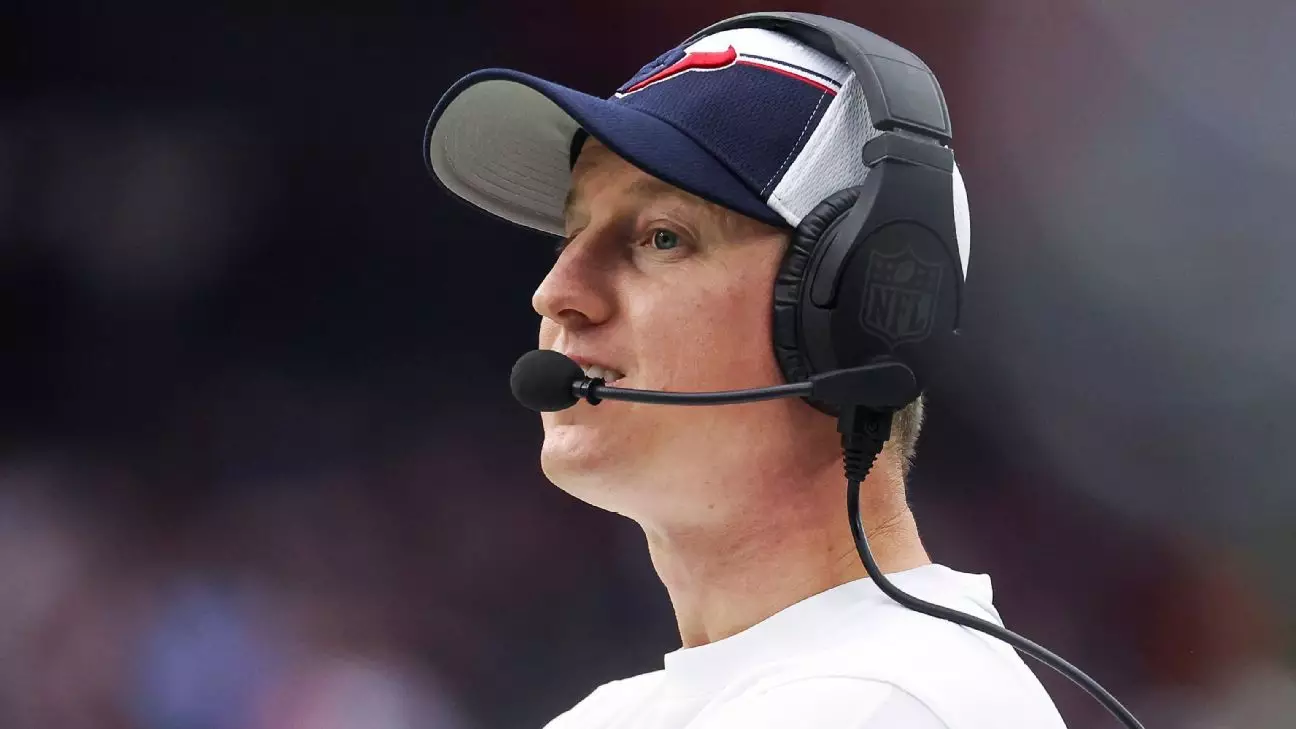The Houston Texans have taken decisive action by parting ways with offensive coordinator Bobby Slowik after two seasons, signaling a wave of transformation within their coaching staff. The decision to also dismiss offensive line coach Chris Strausser and assistant coach Cole Popovich reveals a broader approach to overhaul the offensive strategy that, despite a winning record in 2024 (10-7) and an appearance in the divisional round, failed to meet the expectations set by the organization. This evaluation reflects observations made by head coach DeMeco Ryans regarding the team’s overall offensive output and efficiency during the season.
After the season’s conclusion, Ryans took time to deliberate on the staff’s performance, especially scrutinizing Slowik’s contributions. While Ryans noted some progress under Slowik, his vague commendations hint at underlying concerns. “Overall with Bobby, I saw some growth,” he stated, which suggests that the improvements noted were not significant enough to justify Slowik’s continuation in the role. The Texans’ offensive struggles were glaring, with the unit ranked 18th in scoring at 22.1 points per game and average total offensive yards of 329 per game. These statistics underscore a need for a substantial upgrade in both strategy and execution moving forward.
At the center of these offensive woes was quarterback C.J. Stroud, who suffered repeated setbacks due to an inadequate offensive line. Stroud was sacked an alarming 52 times—the second-highest in the league—and faced pressure on nearly 40% of his dropbacks. This high pressure rate not only disrupted his rhythm but also hindered his growth as a young quarterback. In his rookie season, Stroud had shown promise, throwing for over 4,000 yards and leading the league in multiple passing categories. However, the regression was stark in 2024, as he finished 15th in passing yards with 3,727 and tied for 15th in touchdown passes with 20. The dramatic decline in performance cannot simply be attributed to Stroud’s capabilities; it reflects systemic inefficiencies and coaching failures as well.
The Texans’ offensive line struggled particularly against defensive stunts and twists, indicating a lack of adaptability and preparation. The implementation of these concepts by opposing teams exposed weaknesses that the coaching staff failed to remedy throughout the season. As a result, Stroud’s performance deteriorated under constant duress, ultimately deterring the Texans from leveraging the depth of talent they possessed, including Pro Bowl players like left tackle Laremy Tunsil and running back Joe Mixon.
The Texans demonstrated potential through key player acquisitions, including Pro Bowl wideout Stefon Diggs and Mixon, but inconsistent performances marred the season. Notably, after Diggs’ unfortunate ACL tear, the offense struggled to find a consistent rhythm, particularly in the second half of games, averaging a league-low 7.5 points. This stark shortcoming culminated in weeks without offensive touchdowns, prompting questions about the team’s identity and resilience in the face of adversity.
Key situational statistics, such as 38.9% success on third downs and a dismal 48.4% in the red zone, highlight serious deficiencies in both play-calling and execution. Ryans’ poignant remark indicates that the Texans are aware of the obstacles faced over the year: “There were challenges throughout the year… We have to improve.” This acknowledgment lays the groundwork for a future focused on developing a more dynamic and capable offense that can capitalize on opponent weaknesses and put points on the board.
The departure of Slowik and his staff opens the door for new leadership and experimentation, essential components in rejuvenating the Texans’ offense. A fresh perspective may be necessary to harness the talents of Stroud and his offensive comrades effectively. The Texans must now prioritize building an offensive scheme that maximizes both player strengths and adaptability in strategy.
Looking ahead, it is imperative for the Texans to find a new offensive coordinator who can cultivate an environment conducive to growth and success. As they regroup and set their sights on the future, Houston hopes to transform these setbacks into opportunities that pave the way for greater achievements on the field. The time is now for the Texans to redefine their offensive identity, ensuring that growth is not just a notion but a reality in the seasons to come.


Leave a Reply